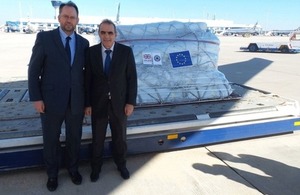UK humanitarian relief delivered to Greece
The UK humanitarian relief was put together following Greece’s request for the activation of the EU Civil Protection Mechanism.

On 3 February, 1,000 tents were delivered by the British government to the General Secretariat for Civil Protection to help Greek authorities cope with the influx of refugees and migrants. The UK is providing £940,000 of in-kind assistance delivered through the EU Civil Protection Mechanism and NGOs in the form of 61,900 blankets, 1,000 tents, 200 solar lanterns, 8,000 inflatable mats, 8,000 sleeping bags, 4 generators and 1,000 floor tiles.
The UK humanitarian relief was put together following Greece’s request for the activation of the EU Civil Protection Mechanism last December. The voluntary delivery of aid was coordinated by the European Commission’s Emergency Response Coordination Centre which has been working closely with the Greek authorities and the other participating states in the Mechanism for a swift response to the Greek request.
DFID coordinated the UK Government’s response in close cooperation with EU and Greek Civil Protection officials. DFID representatives joined British Charge d’ Affaires Andrew Staunton at Athens International Airport for the handover to Secretary General Yannis Kapakis from Greek Civil Protection General Secretariat.
Charge d’ Affaires Andrew Staunton said:
We are delighted to be able to deliver these items to Greek authorities today. This kind of assistance is another part of the UK support to Greece during the migration and refugee crisis. The British Government has already offered humanitarian assistance of over 19 million pounds through IOM, UNHCR, Red Cross and NGOs working in Greece. We know and understand the great pressure Greece has been under because of the huge influx of people, migrants and refugees and we have been impressed by the way ordinary Greek people have responded to this crisis. Europe needs to pursue a comprehensive approach that tackles the causes of the problem as well as the symptoms.
That means helping to stabilise the countries from which the refugees are coming, seeking a solution to the crisis in Syria, pushing for the formation of a new unity Government in Libya, busting the criminal gangs who are profiting from this human tragedy and playing our part in saving lives in the Mediterranean (where the Royal Navy has now rescued over 6,700 people), and providing humanitarian assistance as we have done today.
The UK is providing nearly £55 million to the Mediterranean Migration Crisis response and is the largest contributor to the humanitarian response. Of this support, over £19 million will go to Greece. Additionally, the UK is also creating a new Refugee Children Fund for Europe of up to £10 million to support the needs of vulnerable refugee and migrant children in Europe. The fund will include targeted support to meet the specific needs of unaccompanied and separated children, who face additional risks.
View photos here.
Notes to editors
- Since January 2014, the British Government is helping Greece to assist the voluntary return and reintegration of immigrants to their countries of origin, through a GBP 2million programme, implemented by IOM Greece. So, far more than 1,500 were financially assisted to return voluntarily to their countries of origin (including Afghanistan, Pakistan, Iraq).
Total UK humanitarian support to Greece during the Mediterranean migration crisis amounts to £19.1m. This includes: - £1.05m to IOM to support the efforts of the Government of Greece by distributing non-food items including infant kits to newly arriving migrants on Lesvos and Kos, and providing transport from entry points to registration, screening and basic service centres.
- £8m to UNHCR to deliver humanitarian assistance and protection including improving transit and reception arrangements, provision of basic health and psychosocial care services, prevention and response services for children at risk, improved border monitoring and referral of asylum seekers to relevant authorities and improved management of, and information sharing about, the crisis.
- £1.64m to the Red Cross to deliver vital services to refugees and other migrants including emergency health services, food and other basic provisions and winter items (blankets, clothes and sleeping bags). The Red Cross will also provide family reunion services (Restoring Family Links) in order to re-connect family members divided through this crisis.
- £7.47m for START network NGOs (Action Aid, Catholic Relief Services, Danish Refugee Council, Doctors of the World, IMC, IRC, Mercy Corps, Norwegian Refugee Council, Oxfam, Samaritans Purse, Save the Children) to provide valuable interim assistance in a flexible and agile way, whilst creating the space for governments plan strategies to tackle the ongoing crisis over the longer term. This includes:
- life-saving ‘winterisation’ support for refugees including shelter, water and sanitation, food, nutrition, blankets and winter clothing
- protection for refugees and migrants, notably children, and the most vulnerable, including women and girls.
- supporting governments, local NGOs and civil society organisations to provide assistance through appropriate and specialised services; and
- providing programme management oversight and monitoring including coordination and communication to ensure a coherent and quality response to the crisis.
- £940,000 of in-kind assistance delivered through the EU Civil Protection Mechanism and NGOs in the form of 61,900 blankets, 1,000 tents, 200 solar lanterns, 8,000 inflatable mats, 8,000 sleeping bags, 4 generators and 1,000 floor tiles.